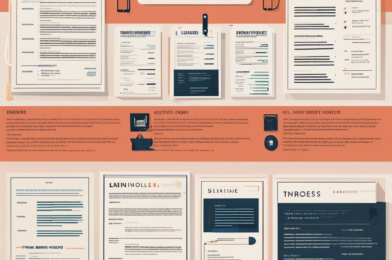Creating a resume that stands out and effectively showcases your skills and experiences is crucial when applying for jobs. Here are some tips to help you craft a resume that will catch the attention of recruiters and hiring managers and increase your chances of landing an interview.
**Choose a Clear and Simple Format:**
Stick to a clean and straightforward resume format that is easy to read and navigate. Use consistent fonts, spacing, and bullet points throughout your resume. Organize your content into easily digestible sections with clear headings. This makes it simple for hiring managers to quickly scan your resume and find the information they’re looking for.
**Tailor It to the Job:**
Customize your resume for each job you apply to. Review the job description carefully and highlight the skills, experiences, and qualifications they are seeking. Ensure your resume reflects how you meet those requirements. Use similar keywords and phrases from the job posting, as this can help your resume get past initial screening processes and show that you are a good fit for the role.
**Highlight Your Accomplishments:**
Instead of simply listing your job duties, focus on your achievements and the impact you made in previous roles. Quantify your accomplishments whenever possible to demonstrate your value. For example, you could mention how you “Increased social media engagement by 25% through innovative content strategies” or “Implemented a new inventory management system that reduced stockouts by 15%.”
**Use Action Verbs:**
Begin each bullet point with action verbs to add impact and energy to your resume. Verbs such as “led,” “developed,” “managed,” “created,” and “increased” help demonstrate your initiative and provide a clearer picture of your responsibilities. These action words can make your resume more engaging and help your accomplishments stand out.
**Focus on Relevant Experience:**
Make sure the experience you include is relevant to the job you’re applying for. If you have limited work experience, you can include internships, volunteer work, or personal projects that showcase skills applicable to the position. Don’t overwhelm your resume with unnecessary details. Each piece of information should support your case for being the ideal candidate.
**Make Your Summary Statement Shine:**
The summary statement at the top of your resume is prime real estate to catch a recruiter’s attention. Write a concise and engaging summary that highlights your most significant accomplishments and qualifications. Focus on the value you bring to the company and the specific role. This summary can set the tone for your entire resume and encourage the reviewer to continue reading.
When applying for jobs, your resume is often the first impression you give to potential employers. Taking the time to craft a well-written and tailored resume can significantly impact your job search, increasing your chances of securing interviews and, ultimately, landing the job you want.
Remember to keep your resume concise, clear, and focused on your relevant skills and experiences. By following these tips and continuously reviewing and editing your resume, you’ll have a powerful tool that showcases your strengths and helps you stand out from the competition. Always proofread and edit your resume carefully before submitting it, ensuring there are no errors or typos, as attention to detail is crucial.
Additionally, don’t be afraid to seek feedback and input from career counselors, mentors, or friends with strong writing skills. An outside perspective can help identify areas for improvement and ensure your resume is the best representation of your qualifications. With a well-crafted resume, you increase your chances of getting noticed by recruiters and opening doors to exciting career opportunities.
When it comes to the length of your resume, aim for one or two pages, depending on your level of experience. If you’re an experienced professional with a substantial work history, a two-page resume is acceptable. However, for recent graduates or those with less experience, a concise one-page resume is usually more appropriate. Ensure your resume is easily skimmable, with concise bullet points and consistent formatting throughout.
In today’s competitive job market, standing out from the crowd is essential. One way to do this is by adding a touch of creativity to your resume, especially if you’re applying for roles in creative industries. Consider using a unique layout, adding color accents, or including charts or graphs to visually represent your skills and accomplishments. However, be careful not to go overboard; the design should complement your content, not distract from it.
Lastly, don’t forget the power of a well-written cover letter. While a resume provides a snapshot of your qualifications, a cover letter allows you to tell your story and express your enthusiasm for the role. It provides an opportunity to highlight specific experiences or skills that align with the job and elaborate on why you’re the ideal candidate. Together, a compelling resume and cover letter can significantly enhance your job application.








